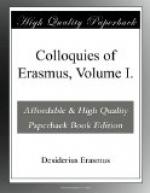Eu. When his Mind is serene; when he’s neither in a Passion, nor in the Hippo, nor in Liquor; then being in private, you may kindly advise him, but rather intreat him, that he would act more prudently in this or that Matter, relating either to his Estate, Reputation, or Health. And this very Advice is to be season’d with witty Jests and Pleasantries. Sometimes by Way of Preface, I make a Bargain with him before-Hand, that he shall not be angry with me, if being a foolish Woman, I take upon me to advise him in any Thing, that might seem to concern his Honour, Health, or Preservation. When I have said what I had a Mind to say, I break off that Discourse, and turn it into some other more entertaining Subject. For, my Xantippe, this is the Fault of us Women, that when once we have begun, we don’t know when to make an End.
Xa. Why, so they say, indeed.
Eu. This chiefly I observed as a Rule, never to chide my Husband before Company, nor to carry any Complaints out of Doors. What passes between two People, is more easily made up, than when once it has taken Air. Now if any Thing of that kind shall happen, that cannot be born with, and that the Husband can’t be cur’d by the Admonition of his Wife, it is more prudent for the Wife to carry her Complaints to her Husband’s Parents and Kindred, than to her own; and so to soften her Complaint, that she mayn’t seem to hate her Husband, but her Husband’s Vices: And not to blab out all neither, that her Husband may tacitly own and love his Wife for her Civility.
Xa. A Woman must needs be a Philosopher, who can be able to do this.
Eu. By this Deportment we invite our Husbands to return the Civility.
Xa. But there are some Brutes in the World, whom you cannot amend, by the utmost good Carriage.
Eu. In Truth, I don’t think it: But put the Case there are: First, consider this; a Husband must be born with, let him be as bad as he will. It is better therefore to bear with him as he is, or made a little better by our courteous Temper, than by our Outrageousness to make him grow every Day worse and worse. What if I should give Instances of Husbands, who by the like civil Treatment have altered their Spouses much for the better? How much more does it become us to use our Husbands after this Manner?
Xa. You will give an Instance then of a Man, that is as unlike my Husband, as black is from white.
Eu. I have the Honour to be acquainted with a Gentleman of a noble Family; Learned, and of singular Address and Dexterity; he married a young Lady, a Virgin of seventeen Years of Age, that had been educated all along in the Country in her Father’s House, as Men of Quality love to reside in the Country, for the Sake of Hunting and Fowling: He had a Mind to have a raw unexperienc’d Maid, that he might the more easily form her Manners to his own Humour.




